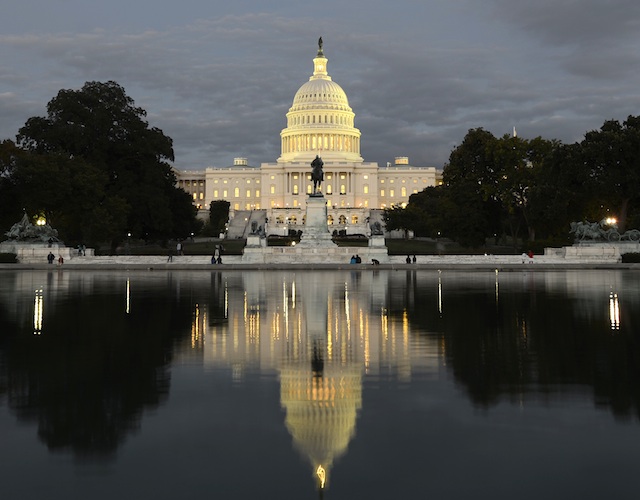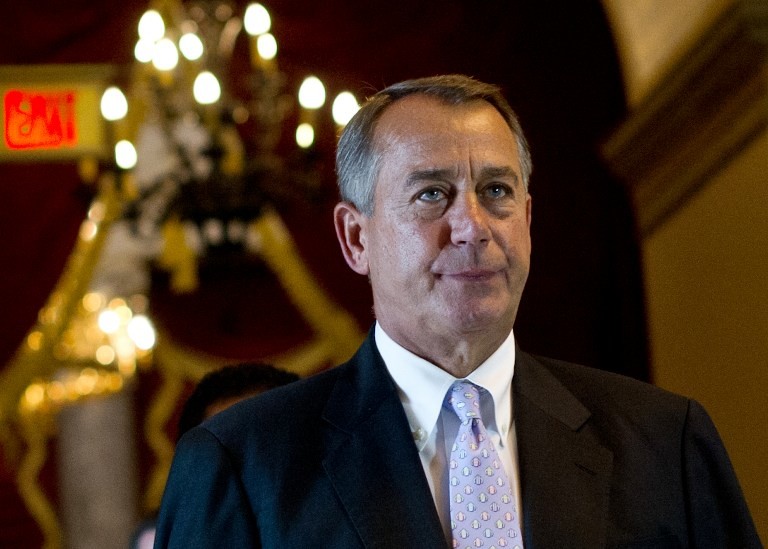SUMMARY
This is AI generated summarization, which may have errors. For context, always refer to the full article.

WASHINGTON DC, USA (UPDATED) – The US House approved early Sunday, September 29, a Republican plan that keeps the government open, but its attempt to delay President Barack Obama’s health care law means the measure is likely dead on arrival.
The measure still needs approval in the Senate, where Democratic Majority Leader Harry Reid said it will be rejected.
“To be absolutely clear, the Senate will reject both the one-year delay of the Affordable Care Act and the repeal of the medical device tax,” Reid said.
The House vote brings the federal government dramatically closer to its first shutdown in 17 years.
Barely two days before a shutdown deadline, Republican leaders set off a political firestorm when they announced Saturday that their stopgap federal spending bill aims to delay implementation of so-called Obamacare by one year.
The White House sharply rebuked the move, and warned it was a step toward shuttering federal agencies once the fiscal year ends Monday night.
It also vowed to veto any such bill. Both chambers would need a two-third majority vote to override a presidential veto, which is close to impossible given the current political breakdown on Capitol Hill.
House Speaker John Boehner nevertheless plowed ahead with the strategy, convening a rare Saturday session (September 28) as Congress struggled to break a funding impasse that, if unresolved, would require hundreds of thousands of federal workers to stay home.
After hours of raucous debate, the House approved the measure, voting largely along party lines.
“Now that the House has again acted, it’s up to the Senate to pass this bill without delay to stop a government shutdown,” Boehner said in a statement shortly after the vote. “Let’s get this done.”

Under pressure from his party’s far-right conservative wing, Boehner doubled down on his caucus’s bid to stop Obama’s signature domestic achievement, the health care law.
The Senate had already stripped a House spending bill of a provision fully defunding Obamacare and sent it back hoping the lower chamber would sign off on it.
But the House instead amended the bill with a one-year delay of the health care law, a repeal of an unpopular medical device tax, and funding of the government at current levels until mid-December, to allow lawmakers to craft a broader budget deal.
“Any member of the Republican Party who votes for this bill is voting for a shutdown,” White House spokesman Jay Carney said Saturday.
‘Pointless’ brinkmanship
The White House Office of Management and Budget separately warned that Obama “would veto the bill” if it reached his desk.
“The American people will not be extorted by Tea Party anarchists,” said an angry Reid, referring to the ultra-conservative faction of the Republican party.
He deriding the House measure as “pointless” brinkmanship that could end in economic crisis.
Driving the point home, a Senate Democratic aide told Agence France-Presse that it was “highly unlikely” the chamber would be in session before Monday, September 30.
Given the Senate’s likely rejection of the House bill in the waning hours of the fiscal year, a Republican aide acknowledged that a temporary shutdown was the likeliest scenario.
House Democrats, a minority force and largely powerless to prevent passage of Republican legislation, worried that the US government would suffer the same fate as a Washington deadlock in late 1995 that resulted in a 21-day work stop.
Democrat David Scott stood up to say what was occurring was nothing less than “a shutdown being ordered by the Republican Party.”
“You have been hijacked by a small group of extreme folks who simply hate this president,” Scott said, breaking protocol as he addressed Republican members directly.
“The American people are never going to forget that it was you who shut down the government.”
Less tha 48 hours for a deal
Boehner and fellow House leaders had struggled to stake out a position palatable to their divided members.
A chorus of criticism – including from Obama and centrist Republicans in the Senate – accused Tea Party-backed lawmakers of unwisely threatening a shutdown if they did not get their way.
“How dare you presume a failure?” Congressman Darrell Issa barked at a reporter who asked what would happen when the Senate rejects the House measure.
“We continue to anticipate that there’s an opportunity for sensible compromise.”
Many conservatives were unapologetic about seeking to put the brakes on a health care law they insist is not ready for prime time.
“I’m a free-market guy, and I truly believe that Obamacare could be the linchpin in shifting America over into an almost irreversible socialist economy,” Congressman Trent Franks said.
Congress now has less than 48 hours to strike a deal that keeps government open, but the ping-ponging of legislation is making that unlikely.
As if anticipating a possible shutdown, House Republicans introduced a separate measure that would ensure US troops get paid in the event of a work stop.
The measure passed unanimously. – Rappler.com
Add a comment
How does this make you feel?
There are no comments yet. Add your comment to start the conversation.